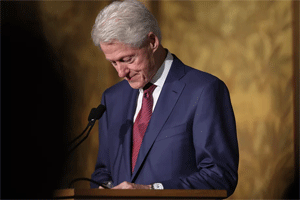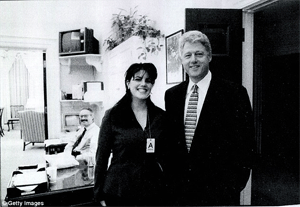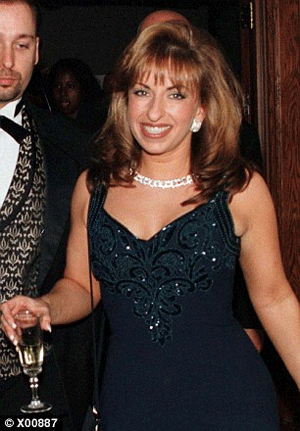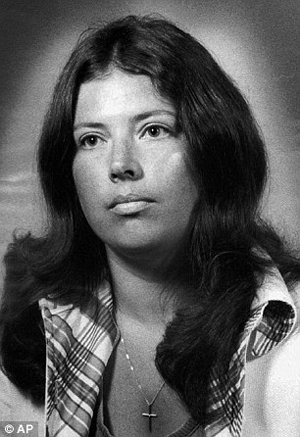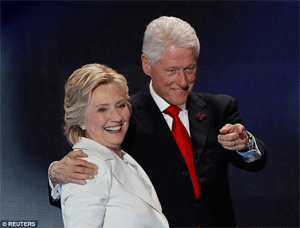by Michelle Goldberg
New York Times
November 13, 2017
NOTICE: THIS WORK MAY BE PROTECTED BY COPYRIGHT
YOU ARE REQUIRED TO READ THE COPYRIGHT NOTICE AT THIS LINK BEFORE YOU READ THE FOLLOWING WORK, THAT IS AVAILABLE SOLELY FOR PRIVATE STUDY, SCHOLARSHIP OR RESEARCH PURSUANT TO 17 U.S.C. SECTION 107 AND 108. IN THE EVENT THAT THE LIBRARY DETERMINES THAT UNLAWFUL COPYING OF THIS WORK HAS OCCURRED, THE LIBRARY HAS THE RIGHT TO BLOCK THE I.P. ADDRESS AT WHICH THE UNLAWFUL COPYING APPEARED TO HAVE OCCURRED. THANK YOU FOR RESPECTING THE RIGHTS OF COPYRIGHT OWNERS.
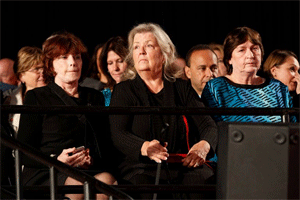
Juanita Broaddrick, center, who has accused Bill Clinton of raping her, at the second presidential debate between Donald Trump and Hillary Clinton. Credit Evan Vucci/Associated Press
On Friday evening the MSNBC host Chris Hayes sent out a tweet that electrified online conservatives: “As gross and cynical and hypocritical as the right’s ‘what about Bill Clinton’ stuff is, it’s also true that Democrats and the center left are overdue for a real reckoning with the allegations against him.” Hayes’s tweet inspired stories on Glenn Beck’s The Blaze, Breitbart and The Daily Caller, all apparently eager to use the Clinton scandals to derail discussions about Roy Moore, the Republican nominee for the United States Senate in Alabama who is accused of sexually assaulting minors.
Yet despite the right’s evident bad faith, I agree with Hayes. In this #MeToo moment, when we’re reassessing decades of male misbehavior and turning open secrets into exposes, we should look clearly at the credible evidence that Juanita Broaddrick told the truth when she accused Clinton of raping her. But revisiting the Clinton scandals in light of today’s politics is complicated as well as painful. Democrats are guilty of apologizing for Clinton when they shouldn’t have. At the same time, looking back at the smear campaign against the Clintons shows we can’t treat the feminist injunction to “believe women” as absolute.
Writing at Crooked.com, Brian Beutler warns that in future elections, right-wing propaganda will exploit the progressive commitment to always taking sexual abuse charges seriously. It’s easy to imagine an outlet like Breitbart leveraging the “believe women” rallying cry to force mainstream media coverage of dubious accusations.
The Clinton years, in which epistemological warfare emerged as a key part of the Republican political arsenal, show us why we should be wary of allegations that bubble up from the right-wing press. At the time, the reactionary billionaire Richard Mellon Scaife was bankrolling the Arkansas Project, which David Brock, the former right-wing journalist who played a major role in it, described as a “multimillion-dollar dirty tricks operation against the Clintons.” Various figures in conservative media accused Bill Clinton of murder, drug-running and using state troopers as pimps. Brock alleges that right-wing figures funneled money to some of Clinton’s accusers.
In this environment, it would have been absurd to take accusations of assault and harassment made against Clinton at face value.
David Brock, the conservative journalistic assassin turned progressive empire-builder, is sitting in a conference room in the Park Avenue South offices of the MWW Group, a public-relations firm owned by Democratic mega-donor Michael Kempner. Fifty-two years old with a silver pompadour, and wearing round glasses with wire frames, he’s barely recognizable as the skinny, dark-haired operative who, during the Clinton administration, had an answering-machine message that said, “I’m out trying to bring down the president.”
That, of course, was before he publicly repented, first in a 1997 Esquire article, “Confessions of a Right-Wing Hit Man,” and then in 2002’s self-flagellating book, Blinded by the Right: The Conscience of an Ex-Conservative. It was before he founded Media Matters for America, which monitors the right-wing media, in 2004, and American Bridge, an unprecedented Democratic opposition-research organization, in 2010. It was before he became a favorite of Bill and Hillary Clinton, the very couple he’d spent his years as an enfant terrible trying to destroy....
These days, Brock has moved well beyond the repentance phase of his political turnaround. He’s no longer trying to ingratiate himself with the Democratic establishment—he’s now a part of it, employing hundreds of people at organizations with budgets in the tens of millions. Recently, his network has been experiencing a spurt of growth—one that’s likely to continue as the Democrats ramp up their efforts on the 2016 race after the disastrous midterm elections.
An avid Hillary Clinton supporter, Brock is already deeply engaged in the presidential contest. His group American Bridge captures almost every public utterance by prominent Republican politicians, using both DC-based researchers and a national network of professional trackers; it currently has people following all of the even remotely plausible contenders for the Republican nomination. Complementing that operation is Correct the Record, a subsidiary of American Bridge that Brock launched last year to push back against misinformation about Democratic presidential candidates, which so far has meant defending Clinton constantly and consistently.
-- How David Brock Built an Empire to Put Hillary in the White House: The Clintons’ former nemesis created an apparatus to fend off their enemies—right and left, by Michelle Goldberg
On Monday, Caitlin Flanagan, perhaps taking up Hayes’s challenge, urged liberals to remember some of what Clinton is said to have done. “Kathleen Willey said that she met him in the Oval Office for personal and professional advice and that he groped her, rubbed his erect penis on her, and pushed her hand to his crotch,” Flanagan wrote, recalling the charges Willey first made in 1998. It sounds both familiar and plausible. But Willey also accused the Clintons of having her husband and then her cat killed. Must we believe that, too?
Bullseye
On Election Day in November, a month before I was to give my deposition, I opened my front door and let Bullseye out. A sweet old cat, he was thirteen years old. He didn't go out much anymore and, when he did, it wasn't for long. He never went far and he always came right back. But not that day. That day, I watched Bullseye jump off the porch and I never saw him again.
I watched election returns and wondered where he was. The next day, I called a few neighbors to see if they'd seen a yellow tabby, a big guy with a red collar. If you lose an animal, the people around here will look. We're all animal lovers, and they knew how I felt. But all the homes were spread far and wide, surrounded by many acres of woods. No one had seen my cat.
I felt bad for Patrick, because he always thought of Bullseye as his cat. Eventually, I had to tell him and he got really angry at the thought that someone had harmed our old cat.
I was shocked when people later mocked me for being upset about Bullseye. People made terrible jokes about him, as if a cat isn't just as much a family pet as a dog. People would have been outraged if he had been a dog! Lucianne Goldberg, for one, made a really snotty remark on a talk show. I was incensed. I tracked her number down and called her. "You know, you don't have any right to make fun of my poor cat like you did today," I said. "Really! He was our pet!" She backed down and apologized right away.
***
Skull
On Monday, two days after I was deposed, I was home alone. Just as the sun was coming up, I opened my front door to let my dogs out. On the porch in front of me was a new horror. A small animal skull was lying on the bricks staring at me. It was bare bone, empty, dry, sitting a few feet from the door. It was the size of a cat's skull.
I thought of Bullseye. Had they had killed my wonderful old cat?
It was payback.
I didn't know what to do with it, and I thought, "I just can't deal with this." I got so mad, I went around to my backyard and I threw it into the woods as far as I could throw. I was really angry -- about the cat specifically, but generally about the scare tactics. I thought, I will not give in to these people!
But I was afraid to tell anybody. I was fearful that it was Bullseye and I didn't want to know. I didn't want to think that somebody would kill a cat -- kill my cat -- to intimidate me. So I didn't tell any officials about the skull right away.
When I finally did tell them about the skull, the FBI came out and found it. "We looked for shoe prints," said FBI investigator Dennis Alvater. "We looked around in the woods for any evidence of people watching the house. I wasn't able to find anything ... " But they did learn that the skull was not Bullseye's. It was a raccoon.
Cats, of course, sometimes drag small rodents to the porch, or bring home similar little gifts. But before this incident and since, not one of my animals has ever brought home any animal bones, and a dog or cat certainly couldn't present a raccoon skull with its face perfectly facing my front door. Besides, my habit is to have all the animals inside the house with me at night. I knew my pets did not put it there.
Later, I watched The Insider, a movie about a witness in a case against "Big Tobacco" and the reign of terror aimed at getting the witness to back away from testifying. The witness opened his mailbox and there was a bullet sitting there. It was a constant campaign of weird things going on. The witness felt like he was being watched. He just knew it. Jack Paladino, one of the Clintons' infamous private investigators, played himself in that movie, doing background research on the witness. I watched that movie with the hair standing up on the back of my neck and thought to myself, Boy, do I know about this!
***
Blarney
After staying in the Keys for most of the spring, I returned home to Virginia for the summer. When I went out in public, people recognized me and every single person who stopped me was kind, comforting, and supportive. To a person, they were compassionate. Their words meant so much to me, but I still felt uneasy in public. I was constantly checking my rearview mirror, looking over my shoulder. I knew they were following me, but where were "they"?
On the Fourth of July, I went out to a baseball game and party. I'd been gone all day and came home after dark. Once inside my house, I realized the door to my deck was open. A second-floor deck, it had no access to the yard. As I went to close the door and turn on the outside light, I saw my black and white cat, Blarney, on the deck. He was dead. A beautiful, longhaired cat with poochy white cheeks, Blarney was the prettiest cat I had ever owned. He was young and strong, healthy, and not quite full-grown. He was a sweetheart. And he was dead.
I called the FBI once again. "Well, now I've got a dead pet on my porch."
The veterinarian did a necropsy on Blarney but could never find the cause of his death. There was no reason why this one-year-old cat should have died. There was no pneumonia, no heart attack, no stroke, no feline leukemia, nothing. No reason. Cats don't just up and die, but they could find no reason for this cat to have died.
It scared me. It was so traumatic and painful that I buried it deep inside myself. I was emotionally overwhelmed, and part of me needed to shut down. I kept thinking, These people are not doing this to me. This cannot be. I don't think I was naive. Rather, it was more like denial. I refused to believe that people existed out there who did things like that, who would take Bullseye and Blarney and kill them. How could they do that? But there were just too damned many bad things happening, and I had to start believing. It was an awful realization.
That same day, my best friend's new kitten died suddenly, too.
As I ended the summer, I looked forward to the close of this long and grizzly saga. It could not last forever, and I looked forward to its resolution. And it was coming. Bill Clinton would give his deposition in mid-August, which would open the final chapter in the drama. Ken Starr would release his report in September. Everything was moving toward a conclusion. I eagerly awaited its arrival.
-- Target: Caught in the Crosshairs of Bill and Hillary Clinton, by Kathleen Willey
Similarly, there are reasons to be at least unsure about Paula Jones’s claim that Clinton exposed himself to her and demanded oral sex. Jones was championed by people engaged in what Ann Coulter once proudly called “a small, intricately knit right-wing conspiracy” to bring down the president. She described “distinguishing characteristics” of Clinton’s penis that turned out to be inaccurate. Her sister insisted to Sidney Blumenthal, then a New Yorker writer, that she was lying. Should feminists have backed her anyway? I’m still not sure, but the evidence was less definitive than that against Harvey Weinstein, Trump or Moore.
Of the Clinton accusers, the one who haunts me is Broaddrick. The story she tells about Clinton recalls those we’ve heard about Weinstein. She claimed they had plans to meet in a hotel coffee shop, but at the last minute he asked to come up to her hotel room instead, where he raped her. Five witnesses said she confided in them about the assault right after it happened. It’s true that she denied the rape in an affidavit to Paula Jones’s lawyers, before changing her story when talking to federal investigators. But her explanation, that she didn’t want to go public but couldn’t lie to the F.B.I., makes sense. Put simply, I believe her.
What to do with that belief? Contemplating this history is excruciating in part because of the way it has been weaponized against Hillary Clinton. Broaddrick sees her as complicit, interpreting something Hillary once said to her at a political event — “I want you to know that we appreciate everything you do for Bill” — as a veiled threat instead of a rote greeting. This seems wildly unlikely; Broaddrick was decades away from going public, and most reporting about the Clinton marriage shows Bill going to great lengths to hide his betrayals. Nevertheless, one of the sick ironies of the 2016 campaign was that it was Hillary who had to pay the political price for Bill’s misdeeds, as they were trotted out to deflect attention from Trump’s well-documented transgressions.
And now they’re being trotted out again. It’s fair to conclude that because of Broaddrick’s allegations, Bill Clinton no longer has a place in decent society. But we should remember that it’s not simply partisan tribalism that led liberals to doubt her. Discerning what might be true in a blizzard of lies isn’t easy, and the people who spread those lies don’t get to claim the moral high ground. We should err on the side of believing women, but sometimes, that belief will be used against us.

